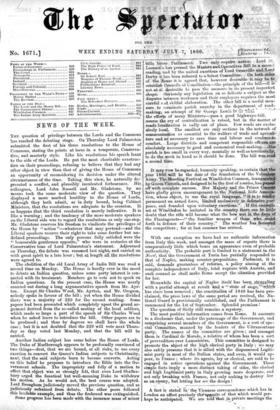NEWS OF THE WEEK.
THE question of privilege between the Lords and the Commons has reached the debating stage. On Thursday Lord Palmerston submitted the first of his three resolutions to the H011130 of Commons, stating the points at issue in a temperate, Conierva- tire, and masterly style. Like his resolutions his speech leant to the side of the Lords. He put the most charitable construc- tion on their proceedings, refusing to believe that they had any other object in view than that of giving the House of Commons an opportunity of reconsidering its decision under the altered circumstances of the time. Taking this view, he naturally de- precated a conflict, and plausibly inculcated forbearance. His colleagues, Lord John Russell and Mr. Gladstone, by no means took the same moderate view of the question. They displayed a more marked hostility to the House of Lords, although they both admit, as in duty bound, being Cabinet Ministers, that the resolutions are adequate to the occasion. It so happens that the third resolution is merely indicative. It is like a warning ; and the tendency of the more moderate speakers on the Liberal side was to regard the resolutions as only one step. Mr. Gladstone reserves his freedom to vindicate the privileges of the House by "action "—whatever that may portend—and the Liberal speakers reserve their right to take some further but un- defined proceedings. The only persons fully satisfied were the " honourable gentlemen opposite," who were in ecstacies at the Conservative tone of Lord Palmerston's statement. Adjourned on Thursday, the debate was resumed last night, and carried on with great spirit to a late hour ; bqt at lensik ,a11,thv resolutions were agreed to.
The abolition of the old Local Army of India Bill was read a second time on Monday. The House is hardly ever in the mood to debate an Indian question, unless some party interest is con- nected with its treatment. Members go to vote not to speak on Indian questions. In the present =case, the House was nearly counted out during a long argumentative speech from Mr. Ayr- ton. Except Sir Charles Wood, Mr. Ayrton, and Mr. Gregson, nobody spoke in favour of the bill ; yet when the House divided there was a majority of 229 for the second reading. Some papers had been presented which completely upset the grand ar- gument derived from the so-called mutiny of the local soldiers, which made so large a part of the speech of Sir Charles Wood when he asked leave to introduce the bill. Other papers are to be produced ; and thus by degrees we shall have the whole case ; but it is not doubted that the 229 will vote next Thurs- day as they voted last Monday, and that the bill will be carried.
Another Indian subject has come before the House of Lords. The Duke of Marlborough appears to be profoundly convinced of two things—first, that we are bound, at all risks, to use every exertion to convert the Queen's Indian subjects to Christianity, next, that the said subjects burn to become converts. Acting on this belief he proposes to introduce the Bible into the Go- vernment schools. The impropriety and folly of a motion to effect that object was so strongly felt, that even Lord Shaftes- bury urged the fanatical but well-meaning Duke to withdraw his motion. As he would not, the beat course was adopted. Lord Brougham judiciously moved the previous question, and as judiciously refrained from debate. The other peers followed this laudable example and thus the firebrand was extinguished. Some progress has been made with the immense mass of minor bills More Parliament. Two only require notice. Lord
Leonari's has pressed the Masters and Operatives Bill to a second reading, and by the united exertions of Lord Granville and Lord Derby is has been referred to a Select Committee. On both aides of the souse it is agreed that, however desirable it may be to establish Councils of Conciliation—the principle of the bill—it is 698 not at al desirable to pass the measure in its present imperfect shape. Obviously any legislation on so delicate a subject as the disputes between workmen and their employers requires the most careful aad skilful elaboration. The other bill is a useful mea- sure to terminate parish anarchy in the department of road- making, an attempt of Sir George Lewis -4i9 :12 7:h1;.'„ --' - the efforts of many Ministers—pass a good highways-bill. course the cry of centralization is raised, but in the matter of roads localisation is sadly out of place. Few roads are exclu- sively locaL The smallest are only sections in the network of communication so essential to the welfare of trade and agrioni- tare and so necessary to save time and labour and conduce-to comfort. Large districts and competent responsible °Moen:fuse absolutely necessary to good and economical road-making. •:,gie parish is toe small in every way, mentally as well as territoritilly, to do the work in hand as it should be done. The bill waa.reatil a second time.


























